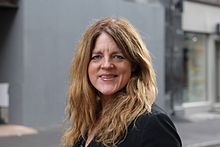Hilde Frafjord Johnson
Hilde Frafjord Johnson | |
|---|---|
 | |
| Special Representative of the Secretary-General for South Sudan | |
| In office 8 July 2011 – July 2014 | |
| Secretary-General | Ban Ki-moon |
| Preceded by | Office established |
| Succeeded by | Ellen Margrethe Løj |
| Minister of International Development | |
| In office 19 October 2001 – 17 October 2005 | |
| Prime Minister | Kjell Magne Bondevik |
| Preceded by | Anne Kristin Sydnes |
| Succeeded by | Erik Solheim |
| In office 17 October 1997 – 21 March 2000 | |
| Prime Minister | Kjell Magne Bondevik |
| Preceded by | Kari Nordheim-Larsen |
| Succeeded by | Anne Kristin Sydnes |
| Personal details | |
| Born | 29 August 1963 Arusha, Tanganyika |
| Nationality | Norwegian |
| Political party | Christian Democratic Party |
| Alma mater | University of Oslo |
Hilde Frafjord Johnson (born 29 August 1963 in Arusha, Tanganyika) is a Norwegian politician from the Christian Democratic Party.[1] She is a former Minister of International Development of Norway, and member of the Norwegian Government. She most recently served as the Special Representative of the Secretary-General and Head of the United Nations Mission in the Republic of South Sudan, completing her term in July 2014 [2]
Early life and education
Born in Arusha, Tanzania to parents who worked for the Norwegian Missionary Society, she came to Norway at the age of 7.[3] She was awarded a Cand. polit. degree at the University of Oslo in 1991, specializing in development anthropology.
Career
Becoming a member of the Young Christian Democrats at age 16,[3] she was elected to the Parliament of Norway for the Christian Democratic Party from Rogaland in 1993 and re-elected in 1997. She served as a member of the Standing Committee on Energy and the Environment. She served as Minister of International Development in Bondevik's First Cabinet from October 1997 to March 2000 and held the same position in Bondevik's Second Cabinet from October 2001 to October 2005.[4]
As minister, Hilde F. Johnson played a pivotal role in the peace process in Sudan, leading to the completion of the Comprehensive Peace Agreement between government and the Sudan People’s Liberation Army/Movement in 2005. She has engaged in peace building efforts and post crisis-transition processes in relation to a number of countries in Africa, Asia and Central America, notably the Horn of Africa, Sudan, Afghanistan, Sri Lanka, Timor Leste, Guatemala and the Great Lakes-region.
She has been involved in efforts to build coalitions for change, both of the UN, in the Bretton Woods Institutions (BWIs) and bilateral aid. In 1998, Johnson initiated the Utstein-group, a group of key likeminded development ministers from the UK, the Netherlands, Germany and Norway to spearhead this agenda. She worked closely with the senior leadership of the UN, the International Financial Institutions and the World Trade Organisation (WTO) and leaders of developing countries, to bring about better pro-poor development policies. She has served as Governor and member of the Board of the World Bank for Norway and the Nordic/Baltic Constituency.
Prior to joining UNICEF she served as Senior Advisor to the President of the African Development Bank in charge of Fragile States policies. Johnson was the co-chair of the Global Coalition for Africa for several years. She was selected a Global Leader of Tomorrow by the World Economic Forum in 2001 . She was member of the High Level Commission on Legal Empowerment of the Poor led by Madeleine Albright, and has served as a member of the Oxford University Taskforce on UK Energy, Development Assistance and Foreign Policy, led by Sir Chris Patten. Johnson was a member of the UNDP hosted Commission on Legal Empowerment of the Poor.
Johnson served as Deputy Executive Director[5] of the United Nations Children’s Fund (UNICEF)from 2007-2011.
References
- ^ Hilde Frafjord Johnson in Store norske leksikon Template:No icon
- ^ Secretary-General Appoints Hilde F. Johnson of Norway Special Representative for Republic of South Sudan
- ^ a b Thomas Holst-Hansen (22 January 2005) Nødhjelperen
- ^ Johnson, Hilde Frafjord ( 1963- ) Stortinget.no. Retrieved 28 December 2013 Template:No icon
- ^ Hilde Frafjord Johnson UNICEF official bio
External links
- 1963 births
- Living people
- Christian Democratic Party (Norway) politicians
- Members of the Storting
- Ministers of International Development of Norway
- UNICEF people
- Norwegian expatriates in Tanzania
- Women government ministers of Norway
- 21st-century Norwegian politicians
- 21st-century women politicians
- 20th-century Norwegian politicians
- 20th-century women politicians
